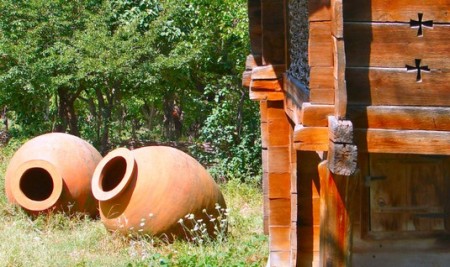Georgian qvevri wine-making method approved as intangible cultural heritage by UNESCO

The traditional Georgian method of making qvevri wine has been approved by UNESCO to be included in the list of Intangible Cultural Heritage.
The decision was made by the 8th intergovernmental committee for the Safeguarding of the Intangible Cultural Heritage in Baku, which was attended by the Georgian delegation headed by the Minister of Culture and Monument Protection of Georgia, Guram Odisharia. The mister said,"Nomination of the traditional method of qvevri wine-making is especially important, since this is the first Georgian intangible cultural heritage which UNESCO approved after enacting the Convention for the safeguarding of the intangible Cultural heritage.
According to the official release of the Ministry, by approving qvevri traditional wine-making method to the UNESCOs list of intangible cultural heritage, it will contribute to popularization of the Georgian wine on the international market.
The professionals group, which has prepared the documentation to be present for the UNESCO nomination, has also prepared a 10 minutes long documentary directed by Merab Kokochashvili describing wine-making process using the qvevri traditional method.
The qvevri is a large is a clay Amphora-like vessel, traditionally buried in the ground up to its neck, in which wine is fermented and stored in regions of Georgia and especially in Kakheti, East Georgia. After the fermentation, which is going on naturally without addition of any nutrients, the qvevri is then sealed with a wooden lid and earth or clay. The wine is left to mature for up to six months, then it is opened and the delicious and bright wine is ready for tasting.
The convention for the safeguarding of the Intangible Cultural Heritage was adopted in 2003 by UNESCO. Traditional music, dances, instruments, objects, artifacts, rituals, festivals, crafts, customs are considered to be intangible cultural heritage. Georgia joined the convention in 2007. Since then, by the Ministry of Culture, the status of the intangible cultural heritage was given to Iakob Gogebashvilis Mother Language book (children's primer), dance Perkhuli, traditional fest Berikaoba, Kakhetian Mravaljamieri song, Meskhetian cheese producing technology, and tradtion of publishing the magazine Dila.
 Tweet
Tweet  Share
Share